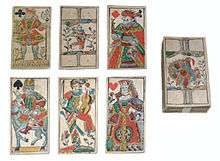Animal tarot

Animal tarots (German: Tiertarock) are a subgenre of tarot decks. The earliest examples are from 18th-century Germany, probably designed by A.B. Göbl of Munich.[1] A theme of animals, real and/or fantastic, replaces the traditional trump scenes of the Tarot of Besançon, a derivative of the Tarot of Marseilles. They are the first known types of French-suited tarot patterns. Patterns with full-figured courts, prominent during the 18th–20th centuries, included the Bavarian and the Belgium styles. Later designs are the Upper Austria Animal Tarot and Adler Cego cards. Animal tarots were most commonly found in northern Europe, from Belgium to Russia, until the decline of tarot card games during the mid-19th century. In Austria-Hungary, they were replaced by the Industrie und Glück decks. The Adler Cego used in Baden is the only animal tarot pattern still in common use.
See also
References
- ↑ Mann, Sylvia (1990). All Cards on the Table. Leinfelden: Jonas Verlag. pp. 81–83, 109–110.
External links
- http://i-p-c-s.org/pattern/ps-8.html
- http://i-p-c-s.org/pattern/ps-9.html
- http://i-p-c-s.org/pattern/ps-10.html